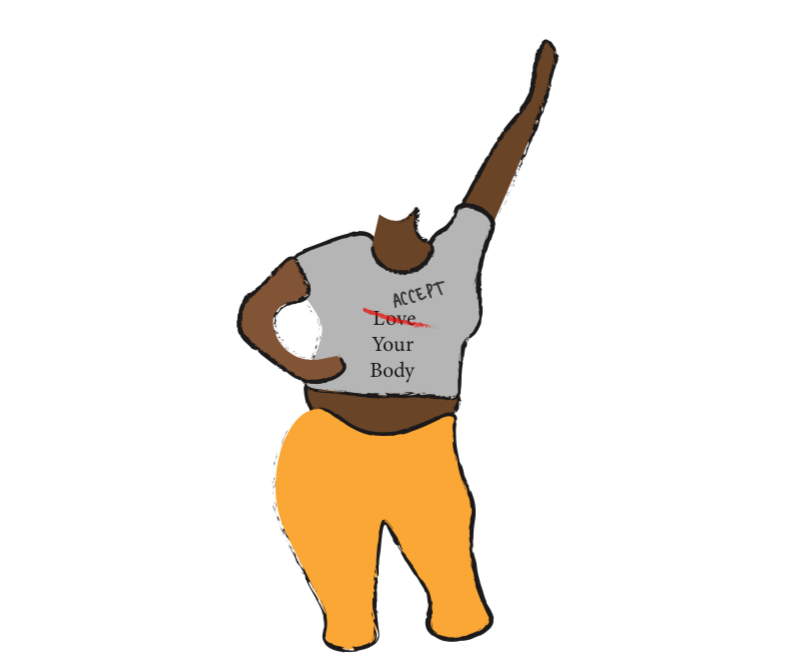Sometimes the notion of accepting ourselves rather than loving ourselves is far more attainable.
As “skinny culture” has prevailed in America for decades, people have tried to shrink, pinch and prod themselves to fit into the standard of a “perfect” body. Many people, women especially, have been drawn to harmful diet culture, intense workout regimens and plastic surgery. These societal pressures also extend to transgender women as well, as they are also pressured to fit into a specific idea of beauty. Things can quickly go from bad to worse as some people begin to additionally suffer from alcoholism, eating disorders and low levels of self-esteem.
The body positivity movement is a social movement that is focused on celebrating all types of bodies while also challenging unrealistic body standards, especially for women. Although men do struggle with body image issues, women are often held to higher standards. If a woman is too thin, she is undesirable and childish in the minds of some people. However, if a woman is curvier, she may be labeled as “fat” by other people. The standards are frankly impossible to achieve. The intention behind this movement to combat stereotypes of beauty and embrace all body types is a great way to improve body inclusivity and celebration, but there are still faults.
When the body positive movement stresses so much focus on our appearances, we will always find things we dislike or wish to change.
It is impossible to always feel beautiful, attractive and confident.
Sometimes there can be a toxic side to excessive self-love because when we don’t feel so in love with ourselves, we may feel like we’re taking 10 steps backward. If one night I feel beautiful and happy with my body but the next morning I wake up feeling insecure and upset with my appearance, it may encourage unhealthy habits. For instance, I may not eat or I may fixate on how I look and have a bad, unproductive day.
Realistically, there are days when everyone feels uncomfortable, insecure or just not like their best selves; The body neutrality movement tells us that that’s okay.
The body neutrality movement is a different approach from body positivity and, at its core, tells us that we can exist without having to dwell on our appearances all the time. Inevitably, it is not always realistic to want to celebrate our bodies, so let’s consider working on our mindset of neutrality.
The body neutrality movement encourages us to recognize what our bodies can do for us, beyond appearances. For example, the body positivity movement may encourage us to adopt the mindset of “I love my arms, fat and all.” Whereas the body neutrality movement would encourage us to consider positive self-talk such as, “I love my arms because they are what I use to hold my child.”
Adopting a more neutral perspective to our appearances and focusing positively on what our bodies’ purposes are can help us to improve our self-view. Not everyone’s bodies are capable of the same things, but for many, we can recognize that our bodies are there to help do a multitude of things: our legs can pull us up a steep hill on a hike and our arms can wrap around a loved one in a hug.
Working to shift our focus on our bodies from solely appearances to celebrating our capabilities and the experiences our bodies allow us to have can help us live our lives without being rooted in insecurity.
Another important aspect of body neutrality is mindfulness. This refers to the concept of caring for our bodies through nutrition, rest and movement without feeling pressured to stick to a specific diet or workout routine. In doing so, we can begin to see how our bodies function well, leading us to feel more content.
It is important for our happiness and fulfillment that we do not limit ourselves from doing the things we love out of insecurity or simply because we are fixated on our bodies.
We should all feel free to get all of the sugar and cream we want in our morning coffees. We should all feel free to go to a spin class in our two-piece workout set even if we do not feel 100% confident in that outfit yet. We should all feel free to exist and not be so constantly concerned with our outward appearances. We should all feel free to live a life without hating our bodies, nor should we feel forced to love them every second of the day.
Our bodies serve us in a lot of different ways, and the body neutrality movement helps us to recognize that our bodies can do so much more than make us feel pretty or ugly. It is important to strike a balance between empowering ourselves and accepting ourselves.
This story was written by Grace Cady. She can be reached at grace.cady@marquette.edu




